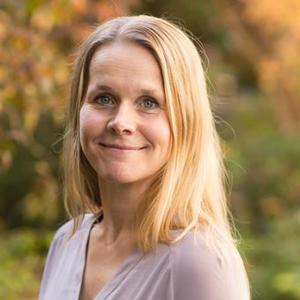“The supercomputer expansion enables researchers to work with larger datasets and faster calculations. This also means that you can seriously work with large language models. Continuous updating of the system is necessary if we want to stay at the forefront,” says Matts Karlsson, vice-rector for research at Linköping University, LiU.
Berzelius was inaugurated in 2021 and made possible through a SEK 300 million donation to LiU from the Knut and Alice Wallenberg Foundation, KAW. A further donation of SEK 125 million from KAW in June 2024 enabled a doubling of its capacity, and the supercomputer is now ready for use.
One of the researchers using Berzelius is Johanna Rosén, professor of materials science at Linköping University. Her research is about finding new materials only one atomic layer thick that can be used for, among other things, water purification and energy storage.
“Powerful supercomputers are incredibly important for the accelerated development of new materials, which is needed when we work for a transition toward a more sustainable society,” says Johanna Rosén.
Data-driven machine learning
Danica Kragic Jensfelt, professor of computer science at the Royal Institute of Technology, KTH, is also a frequent user of Berzelius. She develops robots and AI systems that will be able to learn by interacting with people and the surrounding environment. The goal is robots that can perform different types of tasks in our homes and other complex environments.
“We humans use our different senses to interact with the world around us. We also learn more and better by performing tasks in different environments and by looking at how other people perform tasks – we use teachers. With data-driven models, robots can learn to perform different tasks in a similar way,” says Danica Kragic Jensfelt.
Her research focuses on developing the technologies needed to make this type of learning possible; mainly computer vision, machine learning, control technology and robotics. According to Danica Kragic Jensfelt, supercomputers facilitate the use of large and complex data sets and advanced models can be trained faster and more efficiently.
“The existence of supercomputers is crucial for research. I don’t see a future without them, regardless of research field!”
Increased storage
Berzelius is an NVIDIA SuperPOD supercomputer with different generations of DGX units installed in 2021 and 2023. The current expansion has 16 NVIDIA DGX H200 and includes CPU servers to off-load non-GPU code from the DGX units. The size of fast HBMe memory in a DGX is 1,128 GB. A storage solution from VAST Data increases the available storage capacity with 6 PB to 7.5 PB in total.
“We are proud to have delivered this performance improvement, which is yet another important milestone in our long-standing collaboration with Linköping University. I look forward to seeing scientific breakthroughs come to life through the Eviden-built Berzelius system,” says Bruno Lecointe, Vice President and Business Support HPC, AI and Quantum at Eviden Group, part of Atos, who delivered the system.

